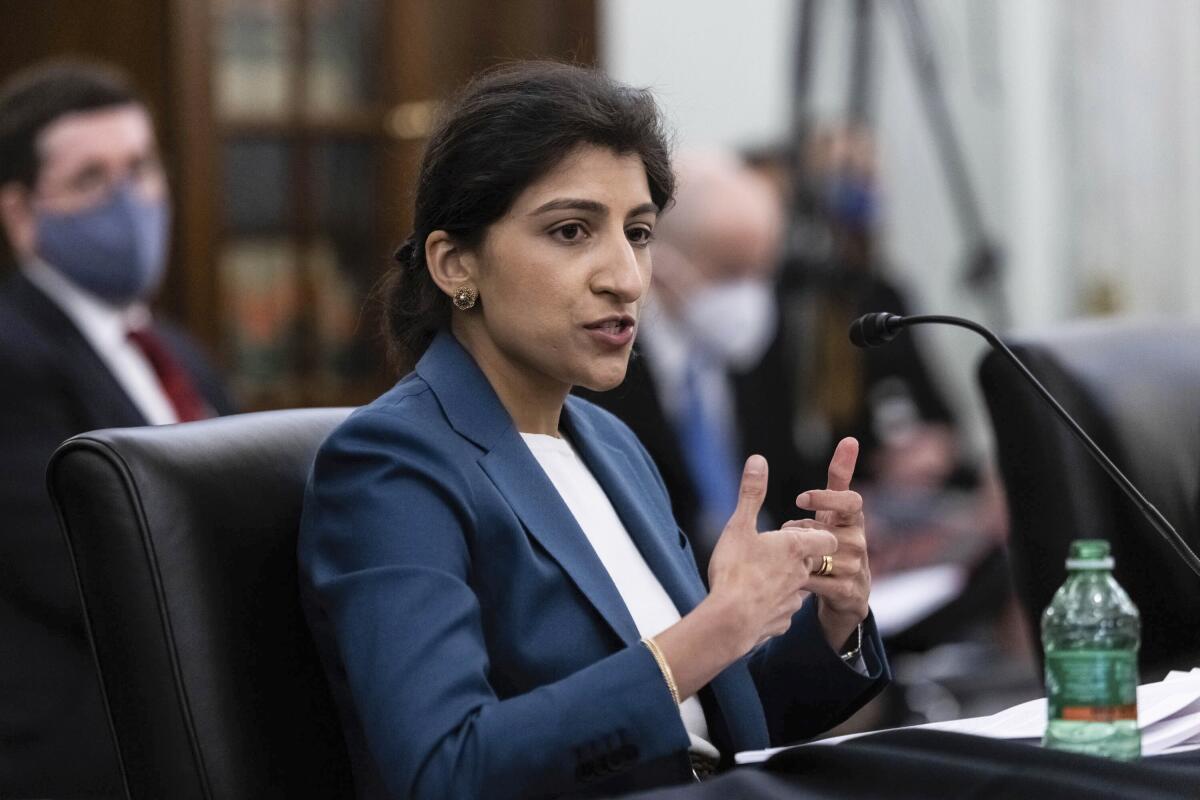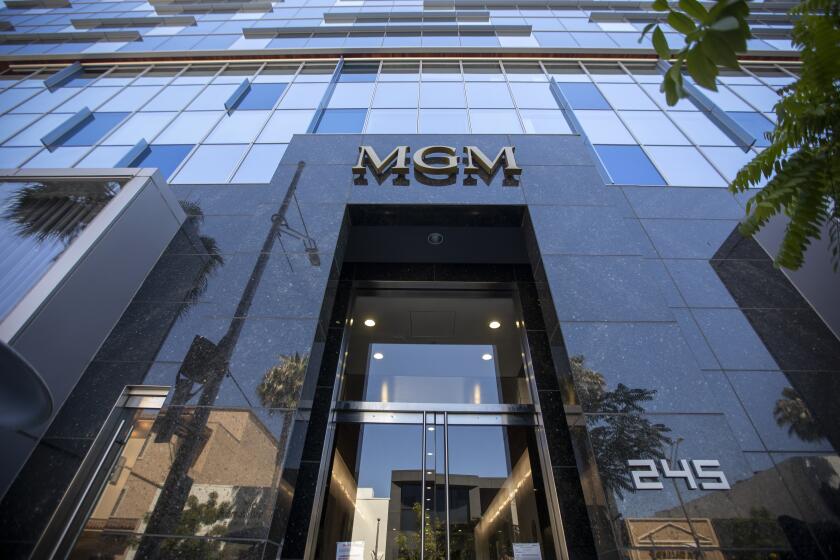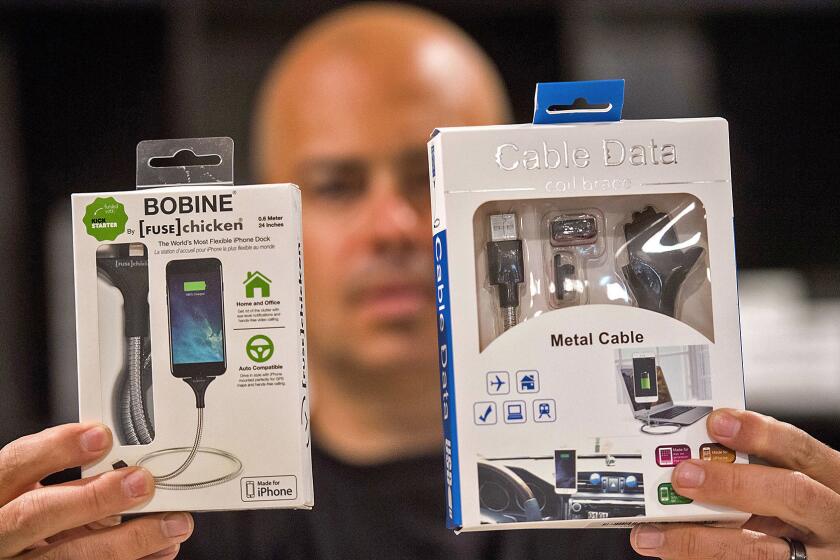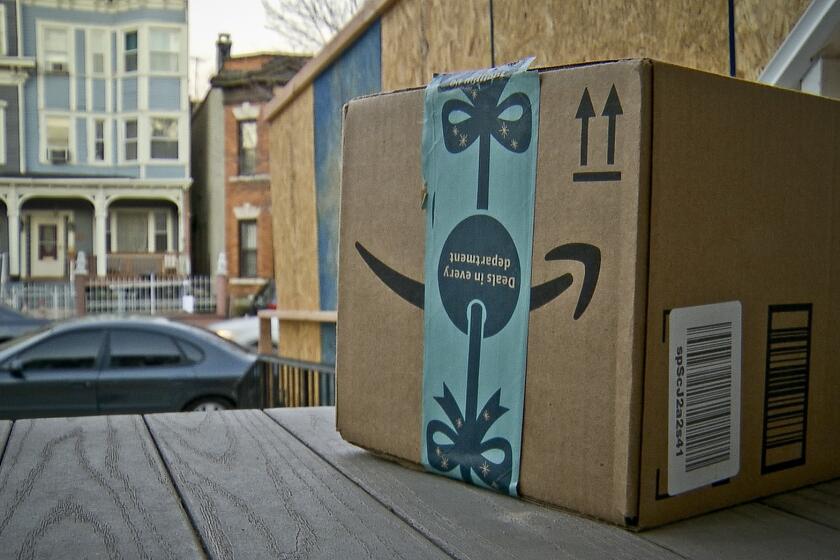Elizabeth Warren calls for more scrutiny of Amazon-MGM deal

- Share via
Despite early rumblings from politicians, many legal experts expected Amazon’s $8.45-billion purchase of MGM to be a straightforward merger without major regulatory hurdles.
But now the acquisition is getting increasingly high-level scrutiny.
On Tuesday, Sen. Elizabeth Warren (D-Mass.) urged the Federal Trade Commission to do a “broad and meticulous review” of the proposed merger, raising concerns about Amazon’s reach in the marketplace and its competitive advantage.
Separately, in a petition filed Wednesday, Amazon questioned the motives of FTC Chair Lina Khan and asked that she be recused from the agency’s antitrust investigation of the company.
Among the concerns cited by Amazon was a paper Khan wrote as a student for the Yale Law Journal discussing Amazon’s dominance called “Amazon’s Antitrust Paradox.”
“Given her long track record of detailed pronouncements about Amazon, and her repeated proclamations that Amazon has violated the antitrust laws, a reasonable observer would conclude that she no longer can consider the company’s antitrust defenses with an open mind,” Amazon said in its petition.
The FTC declined to comment.
The scrutiny raises questions over whether other large tech companies that are growing their presence in entertainment could face similar challenges.
Amazon faces significant competition in the streaming video space from rivals like Netflix, Apple TV+ and Disney+. By buying MGM, Amazon would snap up a library of more than 4,000 movies and franchises like “James Bond” and “Rocky.”
“You control the content, you control the eyeballs, and that’s what’s going to raise the ire of the FTC and other regulatory bodies, is the fact that Amazon already has a lot of eyeballs, just because they have the largest e-commerce platform and now they’re about to acquire their own content and potentially grow their empire,” said Shawn Collins, a consumer protection attorney and shareholder at law firm Stradling Yocca Carlson and Rauth. “So yes, I can assure you that this acquisition will be contested.”
Collins, who had worked on the AT&T and Time Warner merger, said he expects more politicians will speak out against the Amazon-MGM deal, and as momentum builds, he thinks the Department of Justice could try to block the acquisition.
“When you have a name, like Amazon or AT&T, and then you acquire another big company ... everybody is going to pay attention to it,” Collins said.
The deal is the latest in the media industry that’s aimed at boosting streaming services to compete against Netflix and Disney+.
Some legal experts have said they did not expect the acquisition would be blocked.
But Warren said in a June 24 letter to FTC Chair Khan that the Amazon-MGM merger should have “meticulous antitrust scrutiny” by the FTC because Amazon’s streaming service is also tied to its Prime membership. The subscription gives consumers access to other perks such as free shipping, as well as music streams and videos.
“I urge you to use the FTC’s broad authority under this law to assess the possible anticompetitive effects this deal will have on streaming services and entertainment products in addition to the broader impacts that this transaction may have on workers, small businesses, and competition overall as Amazon — which is already the dominant e-commerce firm — accelerates its aggressive monopolistic behavior,” Warren wrote in her letter.
In normal times, Amazon buying a studio like MGM wouldn’t be expected to face serious regulatory challenges. MGM is a drop in the ocean compared with other studios in terms of box office market share, and there is still plenty of competition in streaming video.
Regulators would have a hard time showing how such a merger would harm consumers, said Jonathan Barnett, a professor at USC’s Gould School of Law who is an expert in antitrust. But these are “not normal times in antitrust,” Barnett said.
Political forces in both major parties have made moves to expand action against Big Tech beyond the bedrock standard of whether a merger harms consumers.
For example, regulators have usually seen vertical mergers — or companies buying firms in other businesses — as less harmful than horizontal mergers, or companies buying out competitors. Now, there’s a push for vertical mergers to get more scrutiny.
“In the broadest sense, it’s clear that the administration in general and the FTC in particular not only want to enforce antitrust laws more broadly, but they also seem to want to push antitrust law in a different direction,” Barnett said.
There’s also growing sentiment against companies that are seen as too big and powerful, regardless of whether their size harms consumers under the usual strictures of antitrust law, Barnett said. The Biden administration is reportedly considering executive action that would seek to restrain big business beyond the customary scope of antitrust authorities.
With increasing angst in Washington on the right and left about the power of large tech firms, the FTC may bring a legal challenge to the Amazon-MGM regardless of whether the litigation has much chance of success.
“To allow this merger to go unchallenged in the current political atmosphere might not appear to be responsive to political sentiment,” Barnett said.
Jon Fawcett wanted to build a cellphone cable that wouldn’t fray.
The Writers Guild of America West also has praised legislative efforts to rein in the power of Big Tech.
“More recently, Amazon’s intention to add MGM studios to an empire that already dominates markets spanning the entire content value chain — from production via Amazon Studios, to distribution via Prime, to access to consumers via its Channels store and Fire devices — illustrates the imminent need for greater scrutiny and reform,” the WGA West said in a statement last week regarding antitrust bills.
Amazon has been criticized for its labor practices and its impact on small businesses. Earlier this year, Amazon said it would pay more than $61.7 million in withheld tips to Flex drivers in a settlement with the FTC, following an L.A. Times investigation exposing the practice.
Regarding its petition filed Wednesday, Amazon said in a statement that it believes it “should be scrutinized along with all large organizations.”
“However, even large companies have the right to an impartial investigation,” Amazon said.
Amazon at times dips into the tips earned by contracted delivery drivers to cover their promised pay, a Times review of emails and receipts reveals.
Khan became FTC chair earlier this month and was previously a Columbia Law School professor. She also had worked as counsel to the U.S. House Judiciary Committee’s Subcommittee on Antitrust, Commercial and Administrative Law and as legal director at the Open Markets Institute.
“I look forward to working with my colleagues to protect the public from corporate abuse,” Khan said in a statement at the time.
More to Read
Inside the business of entertainment
The Wide Shot brings you news, analysis and insights on everything from streaming wars to production — and what it all means for the future.
You may occasionally receive promotional content from the Los Angeles Times.















